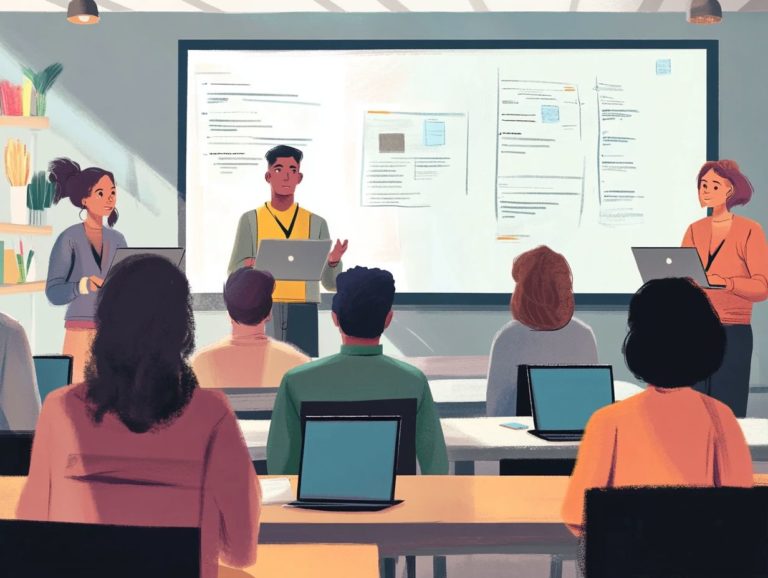Common Myths About Accredited Online Universities
In today s digital landscape, online education stands as a formidable avenue for those aiming to enhance their skills and knowledge.
However, despite its increasing popularity, persistent myths about online degrees often cloud perceptions. Questions regarding their credibility and concerns about available support and resources can easily dissuade potential students.
In this article, we will clear up five prevalent myths surrounding accredited online universities, illuminating their true value and the rigorous standards that underpin their programs. Don’t miss out on understanding these truths about online education!
Contents
- Key Takeaways:
- Myth #1: Online Degrees are Not as Credible as Traditional Degrees
- Myth #2: Online Degrees are Easier to Obtain
- Myth #3: Employers Do Not Value Online Degrees
- Myth #4: Online Universities Lack Resources and Support
- Myth #5: Online Education is Only for Non-Traditional Students
- Frequently Asked Questions
- What are some common myths about accredited online universities?
- Are online degrees from accredited online universities less valuable than traditional degrees?
- Is online education easier and requires less effort?
- Are online universities not as reputable as traditional universities?
- Do online universities have lower academic standards?
- Are online degrees not recognized by employers?
Key Takeaways:
- Accreditation is crucial for online universities to ensure quality education and credibility.
- Online education is rigorous, requiring dedication and hard work, just like traditional education.
- Employers recognize and value degrees from accredited online universities.

Defining Accreditation and Its Importance
Accreditation is a way to ensure schools meet certain educational standards. It evaluates and recognizes educational institutions for meeting specific quality benchmarks, ensuring you receive an education that aligns with established criteria.
This process is especially vital in the realm of online degrees. You want the flexibility of online learning without compromising academic integrity. Institutions like Tomorrow University and Southern New Hampshire University prioritize accreditation to bolster the credibility of their degree offerings while also providing essential support for students.
Accreditation significantly influences your outcomes as a student. It assures you that your investment of time and resources is going into a legitimate and respected program.
This validation extends well beyond the classroom. Employers actively seek candidates from accredited programs, confident that these graduates have met rigorous educational standards. Recognized accreditation also cultivates a supportive learning environment, paving the way for transfer credits and access to federal financial aid, which can greatly enhance your educational journey.
In a time when online learning is on the rise, understanding why accreditation matters is essential for anyone contemplating their academic future.
Myth #1: Online Degrees are Not as Credible as Traditional Degrees
One of the most common misconceptions about online degrees is the belief that they lack the credibility of traditional education. This perception can cloud your understanding of their value in the job market.
However, it’s important to recognize that many accredited programs, such as those offered by Tomorrow University and Southern New Hampshire University, adhere to rigorous educational standards, delivering quality education on par with traditional institutions.
As a result, a growing number of employers are beginning to accept online degrees and appreciate the skills and knowledge that online graduates bring to the table.
Debunking the Myth with Accreditation Standards
Accreditation standards serve as your guiding light for quality education, whether you re pursuing online learning or attending a traditional classroom. These standards ensure that programs meet established educational criteria, which are essential for gaining employer acceptance and achieving student success.
When you choose an accredited program, you benefit from a rigorous curriculum and effective learning practices, helping to dispel the myth that online degrees lack credibility. For more insights, check out understanding accreditation for online degrees. Accredited universities champion the quality and relevance of their degree offerings.
These standards are set by recognized accrediting bodies that evaluate educational institutions based on specific metrics. For you, this means receiving a credible education that prepares you more effectively for the workforce. Graduates from accredited programs often find their degrees respected by employers, leading to improved job opportunities and career advancement.
Understanding accreditation is also crucial when it comes to transferring credits between institutions and accessing financial aid. By grasping these standards, you can navigate your educational journey with confidence and clarity.
Myth #2: Online Degrees are Easier to Obtain

A common misconception surrounding online degrees is the notion that they are easier to obtain than traditional degrees. This undermines the rigorous academic standards and self-discipline necessary for successful completion.
In reality, many accredited online programs require the same level of commitment and engagement as their traditional counterparts. They often integrate real-world applications and hands-on experiences that prepare you for the competitive job market.
Institutions like Tomorrow University and Southern New Hampshire University highlight the importance of meeting course requirements that challenge students intellectually. This fosters a sense of personal responsibility and active involvement in your educational journey.
Exploring the Rigor of Online Education
The rigor of online education is often underestimated. It demands a level of self-discipline and commitment comparable to traditional education.
You ll find that meeting course requirements and applying what you ve learned in real-world situations is crucial. Courses, especially those from accredited programs, require you to tackle comprehensive assessments.
These assessments engage you in peer-to-peer learning opportunities that deepen your understanding and retention of knowledge. This means you will work on real projects that help you learn by doing.
Collaboration plays a vital role as well; you ll regularly participate in group projects that simulate real-world scenarios. This enhances your teamwork and communication abilities.
Such interactive methods are designed to prepare you for future career demands. They equip you to navigate professional environments that value both individual initiative and collaborative effort.
Myth #3: Employers Do Not Value Online Degrees
Forget what you ve heard; online degrees are gaining respect in the job market! The myth that employers disregard online degrees is rapidly fading as more companies begin to appreciate the quality education and skill set that online graduates contribute.
Research indicates that employers are increasingly focusing on the skills and practical experiences gained through accredited online programs. They care more about what you learned than how you learned it.
Institutions like Tomorrow University are at the forefront, utilizing innovative digital resources to elevate student learning and engagement. This ultimately enhances the acceptance of online credentials by employers.
Research on Employer Perceptions of Online Degrees
Research reveals a notable shift in how employers view online degrees. Many organizations now appreciate the quality education offered through accredited programs that cultivate professional connections.
Employers are increasingly acknowledging the skills gained from online learning, which reflects a broader acceptance of diverse educational backgrounds in their hiring processes.
A recent survey by the Graduate Management Admission Council shows that 70% of employers consider online degrees to be on par with traditional ones. This marks a significant change in perspective.
This evolution means that you, as a graduate with an online qualification, can effectively compete in job markets that have historically favored those with conventional degrees. Don t miss out on the chance to advance your career!
To connect education and employment better, institutions must enhance their curricula by forging industry partnerships and integrating real-world projects. Institutions must enhance their curricula to align with employer expectations.
This alignment will help you succeed and stand out in your career, ensuring that your educational outcomes are relevant and impactful.
Myth #4: Online Universities Lack Resources and Support

One common misconception about online education is the belief that online universities lack the resources and support systems crucial for student success. This perspective overlooks the wealth of digital resources and academic support available to today s online learners.
Institutions like Tomorrow University and Southern New Hampshire University offer an impressive array of student support services, including access to academic advisors, virtual tutoring centers, and community connections that greatly enrich the online learning experience.
You can absolutely thrive and achieve your educational goals!
Discover the Amazing Support Available for You!
The resources and support available to you as an online student are extensive, encompassing advanced digital tools, like video calls and chat rooms, and opportunities for meaningful peer interactions. All of this is essential for creating a good place to learn.
Many institutions offer access to academic advisors, virtual classrooms, and networking opportunities that empower you to navigate your educational journey with confidence.
Additionally, many institutions provide digital tools designed to streamline your learning experience:
- Online libraries and research databases equip you with essential academic materials.
- Collaborative platforms, such as discussion boards and group chat functions, facilitate real-time communication and teamwork.
Tech support services are at your fingertips to resolve any technical issues promptly, minimizing disruptions to your studies.
Together, these resources enhance your educational experience and foster a sense of community among students, driving your engagement and success in online courses.
Myth #5: Online Education is Only for Non-Traditional Students
Online education is not just for non-traditional students; it attracts a diverse range of individuals. Many traditional students are eager to join the flexibility and convenience that online learning offers in their educational pursuits.
As online degrees continue to gain recognition, an increasing number of individuals from varied backgrounds are discovering the advantages of this mode of learning, including adaptable schedules and networking opportunities that connect them to a global community of learners and professionals.
Examining the Diversity of Online Student Populations
The diversity of online student populations reveals many individuals from different age groups, educational backgrounds, and career trajectories drawn to the flexibility and accessibility of online education.
You may find that many traditional students are discovering that online programs allow them to balance their studies with personal and professional commitments. This enables you to engage with a global community of learners and gain valuable insights from diverse perspectives.
Recent statistics indicate that approximately 30% of online learners are over the age of 30, showcasing a significant shift in who benefits from this mode of learning.
Case studies demonstrate that students juggling careers, family obligations, or even active military service have thrived in these flexible programs, tailoring their educational experiences to fit their unique circumstances. This adaptability fosters a more inclusive atmosphere and promotes a productive exchange of ideas.
Ultimately, the blend of unique backgrounds nurtures a collaborative spirit, enriching discussions and broadening horizons for everyone involved. Accessibility is critical in modern education.
Frequently Asked Questions

What are some common myths about accredited online universities?
Here are some common myths: online degrees are less valuable, online education is easier, and online universities lack reputation.
Are online degrees from accredited online universities less valuable than traditional degrees?
No, online degrees from accredited online universities hold the same value as traditional degrees. Accredited online universities undergo thorough reviews to ensure their education quality matches that of traditional institutions.
Is online education easier and requires less effort?
No, online education requires the same effort and dedication as traditional education. Some argue that it demands even more self-control and time management skills due to its flexibility.
Are online universities not as reputable as traditional universities?
This is not true. Many respected traditional universities offer online programs, making a degree from an accredited online university just as prestigious.
Do online universities have lower academic standards?
No, online universities follow the same academic standards as traditional ones to maintain accreditation. This ensures students receive a quality education, regardless of format.
Are online degrees not recognized by employers?
Many people mistakenly believe this, but the truth is exciting! Employers recognize and value degrees from accredited online universities, especially from reputable institutions.






